1996
1998
2001
2006
2009
2018
2019
2025
The story of Meshi
Spark of a Vision
Our story begins with a little girl named Ruchama, born with a congenital heart defect and later diagnosed with cerebral palsy (CP) and complex disabilities. Her mother, Lifsha Feldman z”l, searched for a setting that could truly meet Ruchama’s unique needs—with the best therapies and equipment for her physical development, and a nurturing environment for her emotional, social and personal growth.
At just 32 and already a mother of nine, Lifsha reached out to parents like her and found a shared longing. From that deep desire, she shaped an ambitious vision: to create a warm yet cutting-edge therapeutic-educational environment, where extraordinary children could achieve extraordinary things—in every aspect of life.
That vision, sparked by a mother’s love, became Meshi.
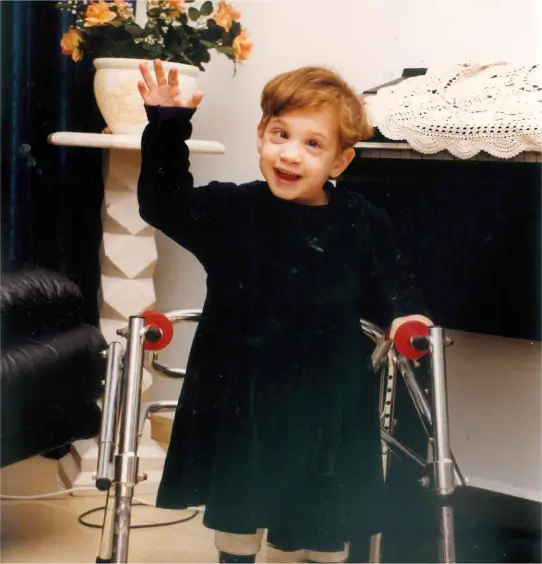
Hope, Willed into Being
Driven by her vision, Lifsha listened closely to the needs and unspoken wishes of special children and their families. She believed that early, multidisciplinary, and personalized intervention was key, and began shaping a holistic center—where abilities, dreams, and aspirations would be given every chance to soar. A place that would offer real solutions—therapeutic and educational, professional and deeply human. One unbound by limitations like funding or convention, but fueled by initiative and driven by a relentless pursuit of what each child truly needs to thrive.
With the unwavering support of her mother, Mrs. Hadassah Zuravin, Lifsha found kindred partners to join her mission. And so, in 1998, the journey began with the opening of Meshi’s first preschool class.
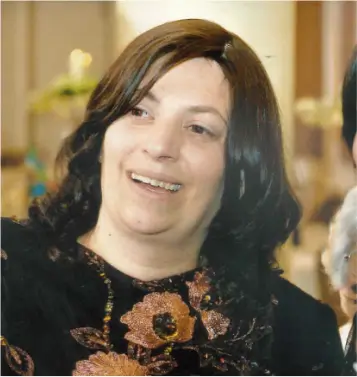
Partners in Purpose
With the help of her mother Hadassah, Lifsha was introduced to Debbie and Howard Jonas—self-made philanthropists whose generosity flows from a deep sense of purpose. Their connection with Meshi was immediate and profound, and they soon became devoted founding partners. Steadfast and generous in spirit and deed, they have stood by Meshi ever since— through every challenge and milestone—offering their funds and expertise with rare humility.
With their backing, Lifsha expanded Meshi’s circle of allies, drawing in more values-driven donors and top experts in rehabilitation and education. Thus in 2001, with four preschool classrooms and dozens of children, Meshi’s first independent center in Jerusalem opened its doors.

Growing with the Children
Supported by diverse professionals, Lifsha kept pace with cutting-edge technologies and forefront practices. Her vision soon evolved into a clear philosophy—holistic yet deeply personalized—driven by a resolve to stretch every boundary and expand every possibility. Later known as the Meshi Approach, this model united multidisciplinary teams working in sync to meet each child’s full range of developmental needs.
As the preschoolers grew and Lifsha witnessed the Meshi Approach’s remarkable impact— it felt only natural to grow Meshi with them. Without hesitation, she rented a nearby building and adapted it to their changing physical and cognitive needs—while continuing to refine the Meshi Approach for every stage of childhood and adolescence.
And so, undaunted by any obstacle, she established Meshi’s first school in 2006.

Carrying the Flame
The school blossomed quickly, doubling in size within just a few years. The Early Childhood Center she had founded kept growing too—remaining at full capacity ever since. But in 2009, just as her vision was taking full shape, Lifsha passed away suddenly at the tragically young age of 45—leaving behind a legacy of care that was both visionary and exacting in its standards. Her devoted partners—led by the Jonas couple, her loving family, and Meshi’s dedicated professional teams—didn’t hesitate to declare her mission their own.
They resolved to bring her pioneering vision to life in every child—to meet each one with the very best solutions, however complex or unique their needs might be.
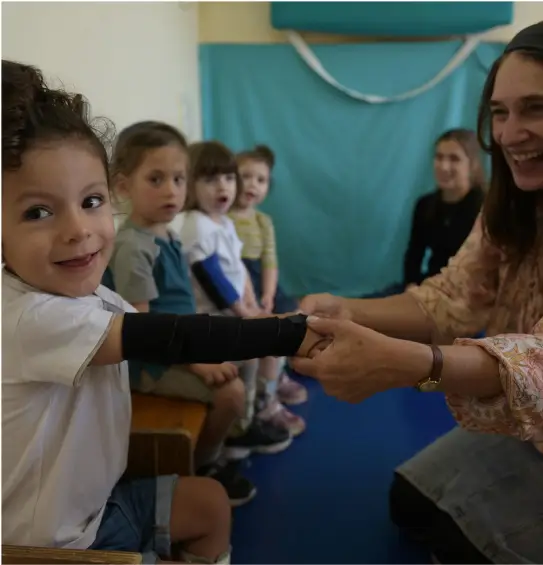
Every Child, Every Path
A decade later, Meshi had become widely recognized as a leading force in holistic education and rehabilitation. Its centers expanded to serve dozens of children across a wide age range, including newly opened classrooms for adolescent girls.
Many of the adolescent boys, however, longed to continue their education in a yeshivah that reflected their way of life and meet their intellectual aspirations—but their complex motor disabilities made it nearly impossible. Too often, they were left without a suitable framework for either their therapeutic or educational needs.
True to Lifsha’s unwavering dedication, Meshi stepped in once again to ensure their continuum of care. And so, in 2018, Meshi founded Binat Danielle Yeshivah—Israel’s first educational-rehabilitative yeshivah.
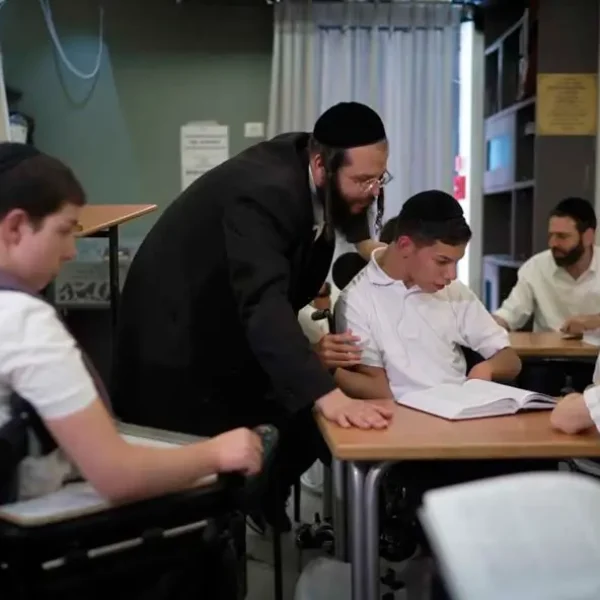
Reach Everyone
As The Meshi Approach proved its impact, the need to expand it grew. Many students from central Israel commuted daily to Meshi’s Jerusalem school, prompting parents, the Ministry of Education, and local authorities to request a closer alternative.
Following in Lipsha’s footsteps, Asher Zoribin, Meshi’s CEO, took action. He secured a location, assembled a multidisciplinary team trained at Meshi, and ensured the new center upheld Meshi’s therapeutic and educational approach.
In 2019, Meshi’s expanding school opened in Bnei Brak, serving dozens of children each year.
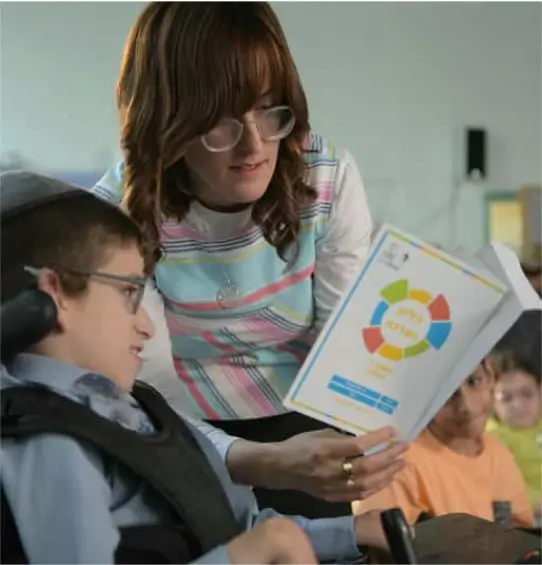
From Spark to Flame
Lifsha’s vision continues to unfold each day across all of Meshi’s centers, offering hundreds of children a uniquely tailored, holistic blend of education and therapy.
Over the years, Meshi has grown into a beacon of inclusion and empowerment:
a warm and nurturing home for children, where every need is met;
a lifeline for families, offering care, community, and unwavering support;
and a trusted center of knowledge, innovation, and excellence for professionals in Israel and abroad.
Yet the story is still being written—a living narrative, constantly evolving through bold ideas, new solutions, and groundbreaking initiatives.
Unfolding the Future
Looking ahead, Meshi is building a groundbreaking new campus—architecturally designed to be fully accessible and tailored to the educational and rehabilitative needs of children. A place where Lifsha’s spark can grow into a vibrant flame—where extraordinary children reach extraordinary milestones and live rich, fulfilling lives.